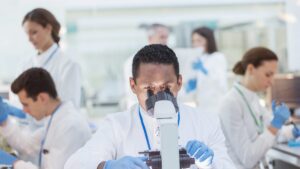Avita’s spray-on skin technology a step closer for US patients

(Pic: Getty)
Avita Medical shares closed higher on Wednesday after a decision by the US Food & Drug Administration (FDA) to simplify access to Avita’s skin rejuvenation product — a move that will see the medical group edge closer to breaking into the US market.
Avita (ASX:AVH), which specialises in the treatment of wounds and skin defects, is trying to commercialise a spray-on skin technology called ReCell.
Shares in the company climbed 0.8c to 7.9c.
The approval will make the protocol more straightforward for burn teams and patients, taking away the need to use a control comparison – so patients will only be treated with ReCell.
“This is one of many de-risking events that we have had following the preparation of the clinical trials and statistical analysis plans,” chief executive Michael Perry said.
“Physicians are saying that it is unethical to continue to use a control arm in something that has already been proven in a clinical trial… From this point I am very confident that there is no FDA hurdle that we will not pass over easily.”
It will also enable doctors to access ReCell while the premarket approval (PMA) application is under review.
Approval to simplify a previous protocol will allow more medical centres and patients in the US to access ReCell, with the number of “approved investigational sites” almost doubling from eight to 15 medical centres.
The PMA application for the ReCell technology was submitted late last month and is now under review by the FDA.
“The new Continued Access protocol … allows us to continue use of ReCell with more focus on what’s best for the patient,” said Dr James Holmes, medical director of the burn centre at Wake Forest Baptist Medical Centre in North Carolina.
While they await the final FDA tick, Mr Perry said they were preparing a very robust commercialisation.
Avita’s sales revenue was $8.1 million this fiscal year, up 129 per cent over the previous period.
Net loss after tax was $11.5 million, up 50 per cent.
Net cash outflows increased by 8 per cent from almost $8 million last year to $8.5 million in the current year.
UNLOCK INSIGHTS
Discover the untold stories of emerging ASX stocks.
Daily news and expert analysis, it's free to subscribe.
By proceeding, you confirm you understand that we handle personal information in accordance with our Privacy Policy.








